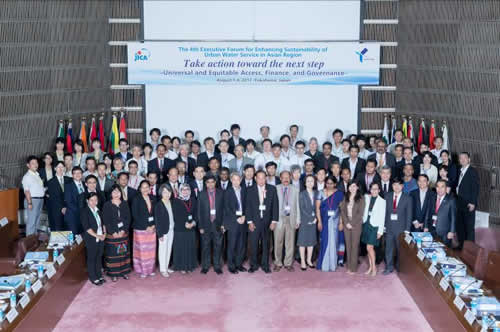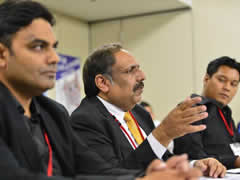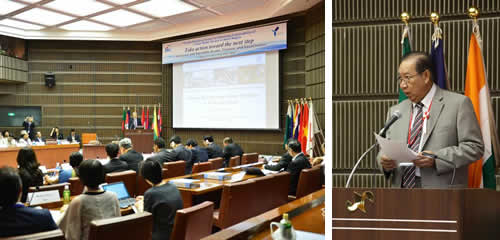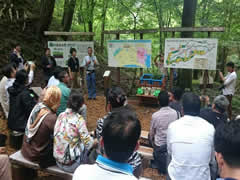The 4th Executive Forum for Enhancing Sustainability of Urban Water Service in Asian Region
On August 1–4, 2017, JICA held the 4th Executive Forum for Enhancing Sustainability of Urban Water Service in Asian Region in partnership with the City of Yokohama, Kanagawa Prefecture, which is considered the birthplace of Japan's modern waterworks. The theme of the forum was "Take action toward the next step". Thirty-two executives from water utilities and water-related government agencies in thirteen Asian countries (Bangladesh, Cambodia, India, Indonesia, Laos, Myanmar, Nepal, Pakistan, the Philippines, Sri Lanka, Thailand, East Timor, and Vietnam) were invited to the forum, which had a total of about 280 participants including Japan's municipal governments, related agencies, universities, private corporations, and other organizations.
1. Mutual learning platform for best practices and lessons learned

The forum brought executives from thirteen Asian countries together with key waterworks representatives from Japan
Many Asian nations are experiencing ongoing population growth and urbanization as a result of rapid development, which in turn has led to a need to increase the supplied population and continue to improve water quality, water supply hours, and other service standards in the process of working to achieve the Sustainable Development Goals (SDGs). More than a few water utilities are still struggling, however, with issues like policy, securing funds, organizational structuring, human resource development, and operations and management. Fostering leadership and fresh awareness among water utility executives and key government authorities is essential to improving water services, which is why JICA has been holding the 4th Executive Forum for Enhancing Sustainability of Urban Water Service in Asian Region since 2010. The event offers participants a chance to create synergy by sharing best practices, lessons learned, and other regional strategies across national borders while strengthening networks of key players within Japan and across water utilities in participating countries. These activities are critical to achieving the forum goal of increasing the number of utilities able to sustainably manage water service in various Asian countries.
The theme of the first forum, held in Yokohama in January 2010, was "Vicious Cycle to Virtuous Cycle". The second forum was held in October 2011 in Tokyo under the theme "Dialogue and Collaboration". The theme of the third forum, held in July 2014 in Yokohama, was "Sustainable management of water utilities". The third forum consisted of five sessions, which were titled "Raising Revenue", "Maintenance of Water Supply Facilities and Procurement of Equipment and Materials", "Human Resources Development", "Partnerships", and "Disaster Preparedness and Mission of Water Utilities". Over the course of these sessions, invited participants from Japan and various other Asian nations presented a variety of initiatives being carried out at their respective organizations so that everyone could learn from the shared insights. In addition, the networks built during the forum continued to function after the event was over, and there were even reports of water utility representatives actually going to visit organizations in other countries to learn about their initiatives in more detail. The program of the latest forum was put together in January 2017 at a Pre-Forum in Cambodia, where some scheduled forum participants exchanged opinions and feedback.
2. Initiatives required for sustainable utility operations
The latest forum kicked off with opening remarks from representatives of the two host organizations: Mr. Makoto Kashiwazaki, Deputy Mayor of the City of Yokohama, and Ms. Noriko Suzuki, Senior Vice President of JICA. These opening remarks were followed by three keynote speeches: "History and lessons learned from 130 years of modern waterworks in Yokohama City" by Mr. Takahiro Yamaguma, Director General at the Yokohama Waterworks Bureau; "PPWSA's success and its expansion to all over the water supply utilities of Cambodia" by H.E. Ek Sonn Chan, Secretary of State, Ministry of Industry and Handicraft of Cambodia; and "Perspectives of urban water services in Asia and Japan" by Professor Satoshi Takizawa from the University of Tokyo. After the keynote speeches, best practices were presented during three sessions: universal and equitable access to safely managed water, finance, and proactive improvement of enabling environment (governance). These were followed by group discussions and then an open discussion. During the group discussions, invited participants went more in-depth on the various country initiatives shared during the best practice presentations. Those who participated in the governance group discussion suggested that strengthening organizational governance requires not only leadership, but also creating awareness among every individual that makes up the organization that they are the ones who make the organization work. Creating this awareness requires visually representing organizational and individual performance through quantitative indicators, as well as carrying out proper evaluations.

Invited participants go more in-depth during group discussions
3. The importance of future-oriented collaboration and cooperation

H.E. Ek Sonn Chan, Secretary of State, Ministry of Industry and Handicraft of Cambodia reads out the Yokohama Forum Statement 2017 for adoption
Among the proposals made during the Wrap-up Session were that (1) long-term missions and action plans are necessary for achieving Goal 6 of the SDGs; (2) in order to secure a safe, stable and sustainable water supply, water utilities must formulate and execute Water Safety Plans; (3) appropriate water tariff collection is essential to achieving sustainable management; (4) to secure resources, water utilities must analyze their current status, put forth the required resource plans, and procure funding from external institutions while reducing costs through reduction of energy consumption, reduction of non-revenue water, and improvement of operation and staff efficiency; and that (5) good governance demands transparency, integrity and accountability as well as the effective use of performance indicators (PIs).
Following these declarations, invited participants reconfirmed the importance of working together to improve water utility operations through the insights and discoveries made during the forum and of further strengthening their collaborative and cooperative efforts. The Yokohama Forum Statement 2017 was then adopted. The forum ended with closing remarks by Mr. Kunihiro Yamauchi, Director General of the Global Environment Department of JICA.

At the Doshi Water Resource Forest in Yamanashi Prefecture, invited participants from Asia listen to an explanation by staff of the Yokohama Waterworks Bureau
Members companies from the Yokohama Water Business Association also ran exhibition booths during the forum in order to introduce their company profile and products, and more. Invited participants from Asia also toured the Aoyama Settling Basin and Doshi Water Resource Forest managed by the City of Yokohama, deepening their awareness of Japan's technologies and experiences. JICA will continue to provide ongoing support to water utilities in Asia in the hopes of improving their management operations.




scroll